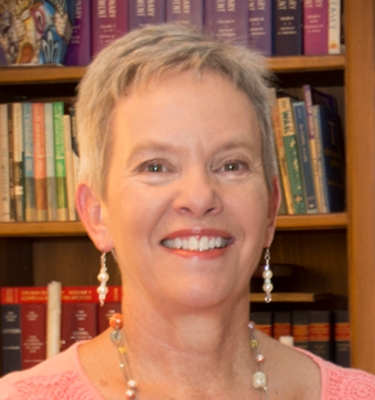To advance in your career toward licensure and professional practice as a psychologist or counselor, you might consider dual masters and PhD programs in psychology online.

These programs let you work through masters and doctoral level courses in a well-planned, seamless program that culminates in a doctorate degree in psychology.
Editorial Listing ShortCode:
Sophisticated, online learning platforms allow universities to deliver academically excellent instruction and mentorship to students. An online psychology graduate program may be an especially good fit for critical thinkers and self-motivated learners.
Dual Masters and PhD Programs in Psychology

Dual masters and doctorate programs are commonly referred to as combination programs because they allow students to merge the two degrees into one continuous plan of study.
Formal curriculum plans for combination programs typically facilitate the double counting of credit hours from specific courses so that those credits apply toward both degrees. In this way, students are not repeating the same material for two different degrees.
The majority of dual degree programs take students through master’s and doctoral level courses, culminating in PsyD degrees. A PsyD is a Doctor of Psychology, and this degree is typically for those who want to pursue clinical work, providing psychological services for clients and patients.
Other dual degree programs lead toward PhD degrees, or Doctor of Philosophy degrees. Dual masters and PhD programs in clinical psychology typically focus on preparing students to become scientist-practitioners in the field of psychology, working primarily in research and teaching.
One distinguishing feature of a dual degree program is that students don’t graduate and stop at the end of their master’s degree program. Instead, they earn a master’s degree along the way to their doctoral degree.
Editorial Listing ShortCode:
Essentially, the master’s degree is incorporated in the pathway to the doctorate. There are slight differences, though, between Master of Arts and Master of Science degree programs within the structure of combination degrees.
The MA in Psychology includes more courses in the liberal arts. Students are trained to perform desk-based research, evaluate programs, and advise organizations regarding mental health issues and policies.
By contrast, MS degree programs typically focus more on research and the sciences, preparing students to work directly in the treatment of mentally ill clients or patients. If your ultimate goal is to complete a PhD or PsyD in Psychology for licensure and career advancement, it may be beneficial and strategic to pursue a dual degree.
While policies for these programs differ among universities, the overall concept appears to offer a streamlined pathway to the terminal degree and qualification for licensed, professional practice.
Psychology Careers & Salaries
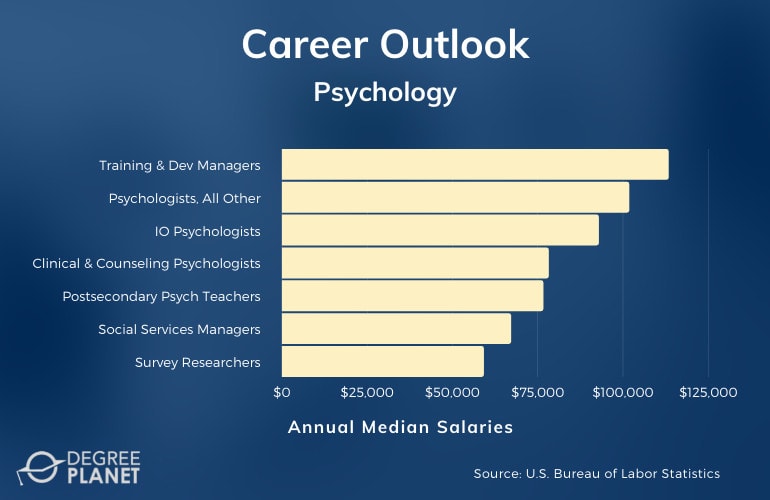
As a psychologist or counselor with a doctorate, you may work in private practices, mental health service organizations, businesses, industries, higher education institutions, and school systems.
Some psychologists work directly with clients to provide treatment for mental illnesses. Still others serve as school psychologists or school and career counselors.
According to the Bureau of Labor Statistics, professionals with master’s and doctoral degrees in psychology may qualify for the following careers.
| Careers | Annual Median Salaries |
| Training and Development Managers | $115,640 |
| Psychologists, All Other | $105,780 |
| Industrial-Organizational Psychologists | $96,270 |
| Clinical, Counseling, and School Psychologists | $79,820 |
| Postsecondary Psychology Teachers | $78,180 |
| Social and Community Services Managers | $69,600 |
| Survey Researchers | $59,870 |
| School and Career Counselors | $58,120 |
| Marriage and Family Therapists | $51,340 |
| Substance Abuse, Behavioral Disorder, and Mental Health Counselors | $47,660 |
Once you’ve completed your master’s and PhD or PsyD degree in psychology, you may conduct independent research and serve as a psychology professor in universities. You may also qualify for managerial or supervisory positions.
For example, a community services manager coordinates and oversees the delivery of psychological services that support public well-being. These services may be offered through a nonprofit organization or government agency.
Psychology Dual Master’s/PhD Curriculum
In a dual degree program, courses may count toward both masters and doctoral degrees, with completion of the doctorate as the target culmination of graduate work.
Editorial Listing ShortCode:
Independent research, practicum experience, thesis, and dissertation completion may intersperse with academic coursework. Here is a list of sample courses you may find in a masters/PhD degree program:
- Research Design and Statistical Analysis: You’ll learn to apply multivariate research designs in diverse, applied research settings, including mixed models, regression, and covariance analysis.
- Developmental Psychology: You’ll explore established theories in social, emotional, and cognitive psychology, as applied to developmental stages, including infancy, childhood, adolescence, and adulthood.
- Methods and Analysis in Survey Research: This course is an overview of survey methods and analysis, including questionnaires, establishing validity and reliability, and the coding and analysis of data.
- Cognitive Psychology: You’ll investigate the mental processes involved in decision making, problem solving, memory, language acquisition and comprehension, and pattern recognition.
- Pedagogy of Psychology: You’ll learn effective teaching strategies and methods for engaging with students in psychology classes.
- Psychology in the Workplace: You’ll explore established research and theories in applied psychology in industrial and business organizations.
- Research in Psychology: You’ll design and implement original research in psychology under the supervision of faculty advisors.
- Substance Abuse Treatment and Physiology: This course examines the physical, mental, and emotional effects of substance abuse on individuals, families, and society.
- Family Therapy Approaches: You’ll investigate therapeutic approaches and develop the skills to provide interventions, such as cognitive and behavioral therapy, with children and families.
- Forensic Psychology and the Law: This course examines the role of forensic psychology and the application of psychological principles in the criminal justice system.
This list represents only a small sample of the courses that may be included in a master’s/Ph.D. dual degree in psychology program.
How to Become a Psychologist

Licensed psychologists typically hold doctoral degrees. Some positions require an additional post-graduate fellowship as well as supervised practice.
Including undergraduate work, the requirements for a career as a psychologist may represent 8 to 12 years of college education. After completing your educational requirements, you may complete 1 to 2 years of supervised work experience.
Editorial Listing ShortCode:
Of course, these timelines are generalities, and students move through their degree programs at individual rates. Earning a dual masters and PhD program may also allow you to finish more quickly.
The following are common steps toward becoming a psychologist:
- Doctoral degree. A masters degree is often a prerequisite for a doctoral program, but you may enroll in a dual masters/doctoral program to get ahead.
- Supervised work hours. The number of required supervised work hours varies by state.
- Apply for licensure. Apply for licensure with the state licensing board in the state you want to work.
- EPPP exam. Pass the Examination for Professional Practice in Psychology (EPPP).
Although the majority of psychologist careers require doctoral degrees, some require only a master’s degree. For example, you may qualify for the role of industrial organizational psychologist or school psychologist with a masters degree along with one year of supervised work.
Admissions Requirements

After you’ve researched numerous masters and PhD combined programs in psychology and selected the one you like the most, the next step is to apply to the program.
Institutions vary in their requirements, but here are a few typical criteria for admission:
- Bachelors degree. It’s beneficial to have a bachelors degree with significant coursework in psychology, equivalent to a major or minor.
- GRE score. Some institutions look for a minimum score on the Graduate Record Exam (GRE), but a number of schools no longer require this.
- Work experience. Work experience or clinical public service
You may also have you a competitive edge if you’ve completed an undergraduate honors thesis in psychology or have worked as a research lab assistant.
Accreditation
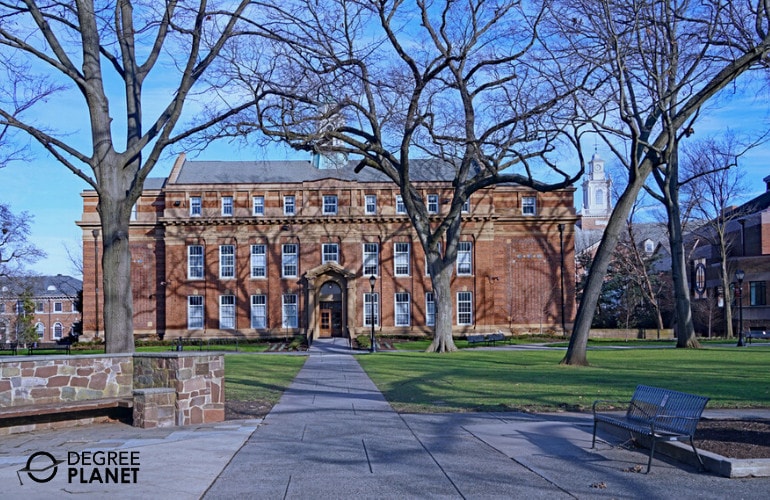
For licensure and future employment, you may want to look for a MA / PhD in Psychology online program from an institution that holds regional accreditation from one of these accrediting organizations:
- Higher Learning Commission (HLC)
- Middle States Commission on Higher Education (MSCHE)
- New England Commission of Higher Education (NECHE)
- Northwest Commission on Colleges and Universities (NWCCU)
- Southern Association of Colleges and Schools Commission on Colleges (SACSCOC)
- WASC Senior College and University Commission (WSCUC)
Degrees from regionally accredited schools are often more respected and recognized by employers as well as other institutions. In order to receive regional accreditation, a school must meet a high standard of academic excellence.
APA Accredited Psychology Programs

Accreditation by the American Psychological Association (APA) is a seal of approval for degree programs in psychology. APA accreditation is a sign of a program’s academic excellence and positive contributions to the psychology profession.
Programs that are fully accredited have met all the standards set forth by the APA. These include quality standards not only for academic excellence but also for outcome data for interns and residents in the program as well as for program alumni.
Licensure and Certifications

After completing your doctoral degree, if you plan to become a licensed psychologist, the next step is to achieve licensure in the state where you plan to practice.
According to the APA, the basic steps toward licensure are as follows:
- Doctorate. An APA accredited degree in psychology from a regionally accredited university is often required.
- Supervised practicum hours. Requirements for supervised practicum hours vary by individual states.
- EPPP exam. Once you apply for licensure with your state board, you can take the Examination for Professional Practice in Psychology (EPPP).
In some cases, passing a jurisprudence exam is also required. Once you complete all of your state licensing board’s requirements, you may become a licensed psychologist.
Financial Aid and Scholarships

Visiting the US Department of Education’s Federal Student Aid website can be a helpful first step when planning for your degree. Here, you can fill out and submit your FAFSA form to begin the process of accessing financial assistance for graduate school.
Student aid is available to qualifying students in several forms, including loans, grants, scholarships, and work-study programs. You can investigate both merit-based and need-based scholarships from universities, alumni organizations, and philanthropic sources.
Editorial Listing ShortCode:
If you’re a military veteran, active military personnel, or a member of a military family, you may qualify for special financial assistance. You can learn more about military assistance programs on the federal student aid website.
Can I Get My Masters and PhD at the Same Time?

Yes, in a dual degree program, you can work through your master’s degree requirements on your way to completing your doctorate, all in one seamless program of study. The master’s degree is earned along the way, so there’s no delineated stopping point.
Many dual degree programs facilitate the double counting of course credit hours so that you don’t need to repeat the same material twice for two degrees.
With combined masters PhD programs psychology professionals may tailor their coursework, practicums, and research to focus on the areas of the psychology field where they intend to pursue professional practice.
Do You Need a Masters to Get a PhD in Psychology?

To enter a dual masters and PhD or PsyD degree program, you don’t need to hold a previously completed masters degree. You may enter with a bachelors degree and earn the masters along the way toward completing a doctorate in psychology.
The term that is sometimes applied to this type of master’s degree is “en passant,” meaning that you earn your master’s in passing on the way to completing your doctoral degree.
Students who already hold a masters degree may enter a dual degree program, and their credits may be applied toward completion of the terminal degree. This may help reduce the time it takes to progress through the program and complete the PhD.
What Is the Difference Between a PsyD vs. PhD in Psychology?

A Doctor of Philosophy (PhD) degree program in psychology focuses on preparing students to generate new knowledge through research.
Additionally, PhD candidates focus on preparation to teach psychology in colleges. Professionals who hold the PhD in psychology may also work in health services organizations, as school and career counselors, and as consultants in business and industry, making a psychology degree worth it for many students.
Alternatively, combined masters and PsyD programs online culminate in the Doctor of Psychology degree. PsyD programs focus on training candidates to apply scientific principles of psychology in the direct treatment of clients and patients.
Both types of psychology doctoral programs may prepare students for state licensure exams, and graduates from both PhD and PsyD programs may work as licensed, clinical psychologists.
Universities Offering Dual Masters and PhD in Psychology Degree Programs
Methodology: The following school list is in alphabetical order. To be included, a college or university must be regionally accredited and offer dual degree programs in Psychology online or in a hybrid format.
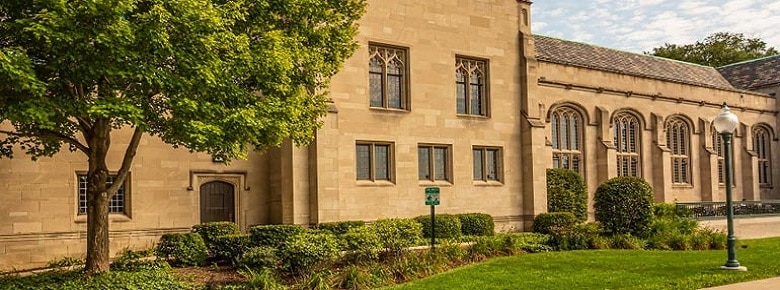
DePaul University’s dual Masters and PhD in Psychology program allows students to gain the clinical knowledge and methodology practice to better understand diverse issues within society. With two focus areas to choose from, students can select the community pathway or the child route to help them achieve their goals.
DePaul University is accredited by The Higher Learning Commission.

Georgetown University’s dual degree in psychology allows learners to gain a masters degree and a PhD over 5 years through interdisciplinary studies.
Offering a choice of two concentrations, learners can specialize in human development and public policy or lifespan cognitive neuroscience. Research in social theories, methods, and action are part of the cornerstones of this program.
Georgetown also offers a variety of combined masters degree programs online or in a traditional classroom setting.
Georgetown University is accredited by the Middle States Commission on Higher Education.

John F. Kennedy University offers a groundbreaking experience in education by helping students acquire an MA in Sport Psychology and a PsyD in Clinical Psychology at the same time. This degree program prepares learners to work as clinical practitioners or to work with athletes on and off the field.
Kennedy University is accredited by the WASC Senior College and University Commission.

Loyola University of Maryland allows students to combine a Masters and Doctorate in Psychology into one program that can be completed in 5 years, including a dissertation. LU’s dual program focuses on communication, diversity, ethics, clinical research, and many other standards to ensure students can show competency in this field.
Loyola University Maryland is accredited by the Middle States Commission on Higher Education.

Obtaining a dual MA and Doctorate in Psychology from Portland State University gives students the necessary tools to confront the complex issues surrounding social difficulties in communities today.
This program focuses on research, methodology, and innovative solutions that can bring positive change in society. PSU’s program has five specializations and a small teacher to student ratio.
Portland State University is accredited by the Northwest Commission on Colleges and Universities.

The graduate program in psychology at Saint Louis University provides learners with the ability to gain their PhD while getting a masters degree. Students enrolled in this program will complete 30 credit hours in clinical psychology, 42 credit hours towards their doctoral degree, and a dissertation. There are several specializations to choose from at SLU.
Saint Louis University is accredited by the Higher Learning Commission of the North Central Association of Colleges and Schools.

Learners looking to participate in the PhD and MPH dual program at the University of Alabama must apply to each program separately.
Once accepted, students will become immersed in scientific practice and coursework that focuses on the skills needed to excel in clinical psychology. Areas of concentration include child psychology, ethics and law, and clinical health.
The University of Alabama is accredited by the Southern Association of Colleges and Schools Commission on Colleges.
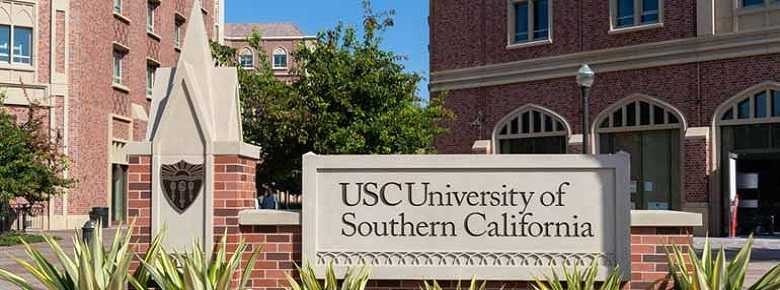
The University of Southern California offers a program that allows students to gain a Masters in Public Health and a Doctorate in Philosophy simultaneously.
This dual degree program blends clinical research and hands-on learning with society’s health strains. USC requires program students to complete the dissertation process and choose a specialization out of the three concentrations offered.
USC is accredited by the Western Association of Schools and Colleges.
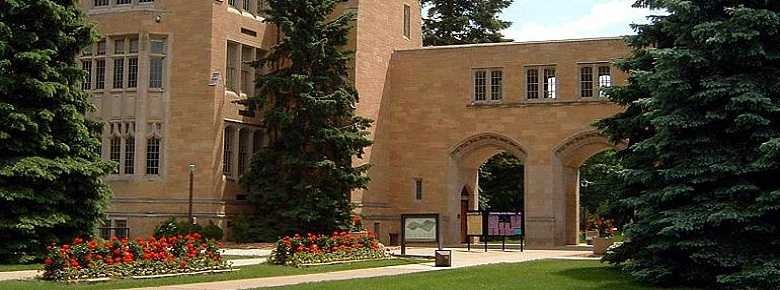
The MA with Direct Admission to the PsyD in Counseling Psychology program from the University of St. Thomas gives learners the opportunity to study the basis of psychological theories and counseling methods. At UST, students can take classes around their busy life by choosing courses on weekends, on nights, or during the day.
The University of St. Thomas is accredited by the Higher Learning Commission.

Widener University’s PsyD and MCJ dual program allows students to engage in practical learning and internships while obtaining a doctorate in psychology. Coursework, internships, and a research dissertation drives the learning process at WU. This dual program can qualify graduates to work and advocate in the criminal justice system.
Widener University is accredited by the Middle States Association of Colleges and Schools.
Getting Your Combined Masters and PhD in Psychology Online

To reach your full potential in the field of psychology, you may consider enrolling in a combined masters and PhD program online. Thanks to advanced, virtual learning platforms, you can access the same academic experience online that on-campus students receive in classrooms.
With online learning, you may enroll full-time or part-time to meet your individual needs, whether you are in a masters in forensic psychology online program, one in child psychology, or in a dual masters / doctorate degree program. Many students are able to maintain work and family responsibilities while completing graduate courses online.
Plus some students even find it beneficial to enroll in accelerated online psychology degree programs that a growing number of universities offer.
If you’re interested in this academic path, you may start investigating online, APA accredited dual degree programs from regionally accredited universities. This could be a strategic step toward your professional future in this rewarding field.

